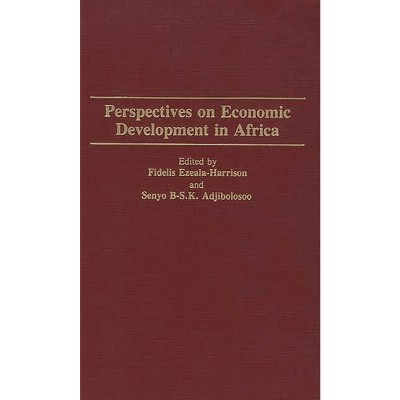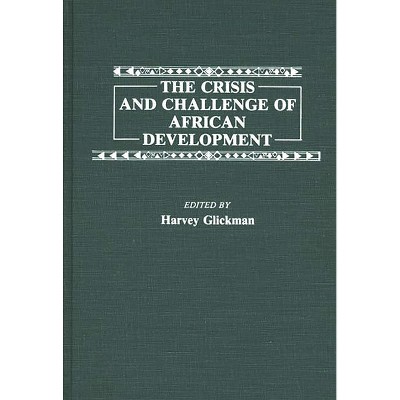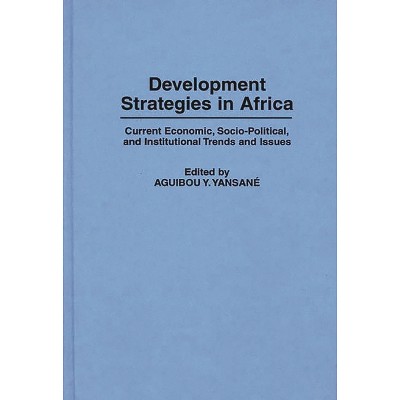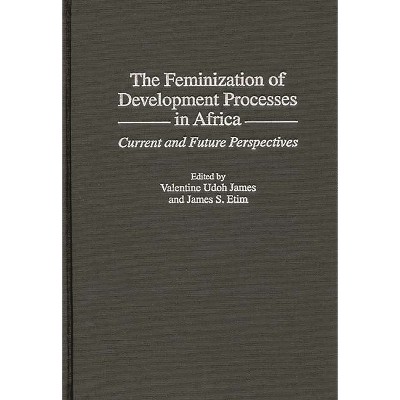Sponsored

Africa and the Challenge of Development - by Ahmad Abubakar (Hardcover)
In Stock
Sponsored
About this item
Highlights
- Although much has been written about African development since the beginning of independence, officials in government have contributed very few studies directly involved in development work.
- About the Author: AHMAD ABUBAKAR is Acting Director of the Center on Integrated Rural Development for Africa (CIRDAFRICA) in Tanzania.
- 160 Pages
- Business + Money Management, Development
Description
About the Book
Although much has been written about African development since the beginning of independence, officials in government have contributed very few studies directly involved in development work. This book fills that gap by providing a practically-oriented analysis of Africa's ongoing development problems. In contrast to most theoretical works which attempt to explain underdevelopment as the result of a lack of capital, manpower shortages, or colonial history, Abubakar proposes that Africa's development problems should be seen in terms of dependency and lack of capital, manpower shortages, or colonial history. He argues that Africa's development problems should be seen in terms of dependency and a lack of commitment to develop. He argues further that the African governments' attitudes toward development, which until now have not received adequate attention in the literature, are a crucial factor in explaining Africa's problems with underdevelopment.
Abubakar asserts that while it is true that colonialism has contributed to underdevelopment, the colonial experience should cease to be a scapegoat for Africa's failure to develop. Similarly, he demonstrates that aid has never been a solid basis for African development. Based upon his extensive experience, Abubakar concludes that three things are necessary to solve Africa's economic problems: a concrete commitment to development on the part of African governments; a realistic effort to end dependence on the global economic system; and a people-oriented and self-reliant government strategy.
Book Synopsis
Although much has been written about African development since the beginning of independence, officials in government have contributed very few studies directly involved in development work. This book fills that gap by providing a practically-oriented analysis of Africa's ongoing development problems. In contrast to most theoretical works which attempt to explain underdevelopment as the result of a lack of capital, manpower shortages, or colonial history, Abubakar proposes that Africa's development problems should be seen in terms of dependency and lack of capital, manpower shortages, or colonial history. He argues that Africa's development problems should be seen in terms of dependency and a lack of commitment to develop. He argues further that the African governments' attitudes toward development, which until now have not received adequate attention in the literature, are a crucial factor in explaining Africa's problems with underdevelopment.
Abubakar asserts that while it is true that colonialism has contributed to underdevelopment, the colonial experience should cease to be a scapegoat for Africa's failure to develop. Similarly, he demonstrates that aid has never been a solid basis for African development. Based upon his extensive experience, Abubakar concludes that three things are necessary to solve Africa's economic problems: a concrete commitment to development on the part of African governments; a realistic effort to end dependence on the global economic system; and a people-oriented and self-reliant government strategy.Review Quotes
?No longer a call in the wild, Ahmad Abubakar's critical review of development prospects in Africa adds an important voice to a new generation of political economy writing on Africa.?-Perspectives on Political Science
?The poor performance and uncertain prospects of the economies of black African countries are of concern to many. This offering on the subject was written by the acting director of the Center for Integrated Rural Development of Africa in Arusha, Tanzania. Not surprisingly, the author stresses the need for rural development. Most African countries have predominantly rural populations, with low incomes and little access to basic services. Development projects are oriented toward the urban and elite segments of the population, and Abubakar says this needs to change to help those most in need. He also calls for greater self-reliance on the part of African countries, feeling that the African economies are too involved in the international economy, which is controlled by the capitalist countries. The capitalist countries keep the African economies, along with other Third World countries, in a dependent position, which results in reduced growth and development. Abubakar makes a number of good points as he writes of the need for better management, the difficulty of the debt burden, and the elite's desire to retain power and its attendant benefits.?-Choice
"No longer a call in the wild, Ahmad Abubakar's critical review of development prospects in Africa adds an important voice to a new generation of political economy writing on Africa."-Perspectives on Political Science
"The poor performance and uncertain prospects of the economies of black African countries are of concern to many. This offering on the subject was written by the acting director of the Center for Integrated Rural Development of Africa in Arusha, Tanzania. Not surprisingly, the author stresses the need for rural development. Most African countries have predominantly rural populations, with low incomes and little access to basic services. Development projects are oriented toward the urban and elite segments of the population, and Abubakar says this needs to change to help those most in need. He also calls for greater self-reliance on the part of African countries, feeling that the African economies are too involved in the international economy, which is controlled by the capitalist countries. The capitalist countries keep the African economies, along with other Third World countries, in a dependent position, which results in reduced growth and development. Abubakar makes a number of good points as he writes of the need for better management, the difficulty of the debt burden, and the elite's desire to retain power and its attendant benefits."-Choice
About the Author
AHMAD ABUBAKAR is Acting Director of the Center on Integrated Rural Development for Africa (CIRDAFRICA) in Tanzania. He is an economist with wide-ranging experience in African development.Shipping details
Return details
Frequently bought together
Trending Non-Fiction

















